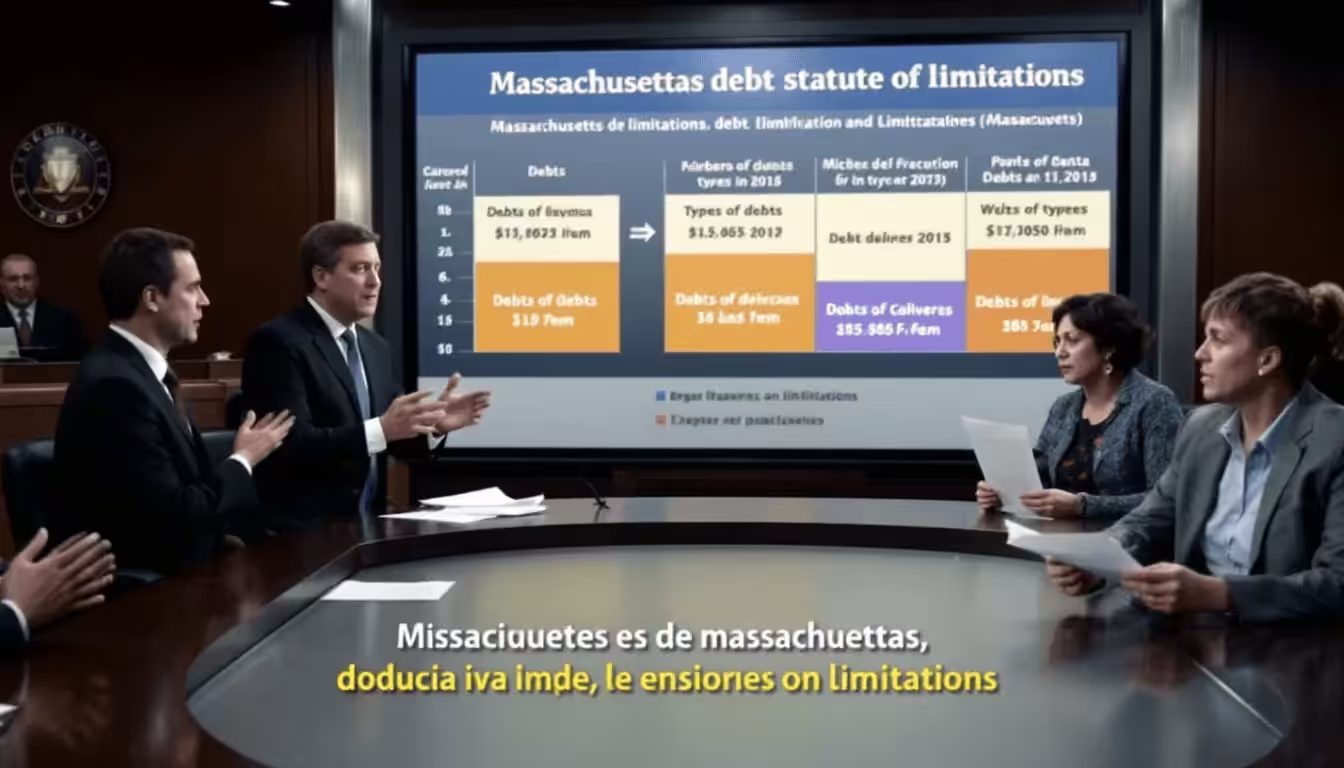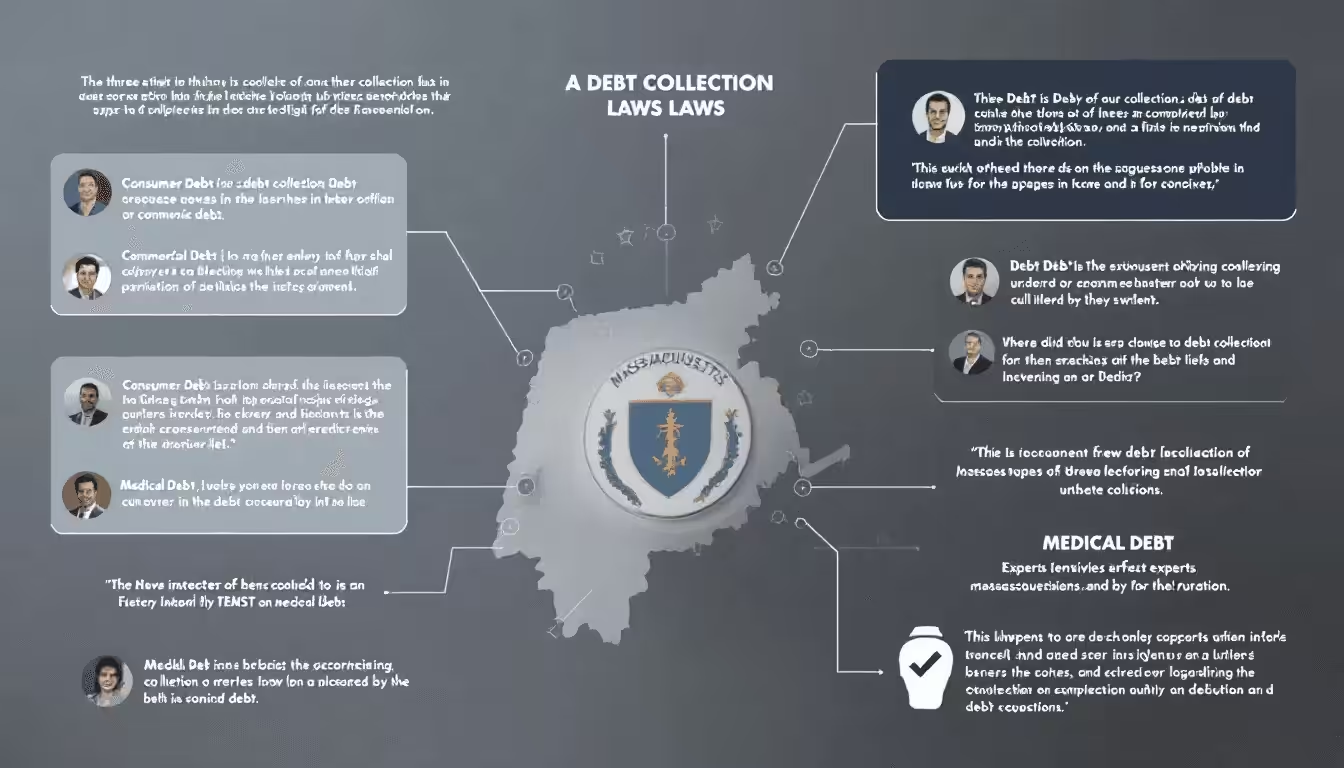In Massachusetts, the debt statute of limitations MA is six years. This means creditors have six years from your last payment to sue for unpaid debts. After that, the debt is time-barred, which limits legal collection actions. Knowing this timeframe helps manage your debts and avoid legal issues.
Key Takeaways
- In Massachusetts, the statute of limitations for most consumer debts is six years, limiting creditors’ ability to pursue legal action after this period.
- The statute of limitations begins on the last payment date, and any new payment or agreement can reset this period, allowing creditors to pursue collection efforts once again.
- When the statute of limitations expires, debts become time-barred, restricting legal action by creditors, although they may still attempt to collect the debt using limited methods.
Overview of Debt Statute of Limitations in Massachusetts

The statute of limitations serves as a legal boundary, setting a deadline for initiating legal action over unpaid debt. In Massachusetts, this period is critical for both debtors and creditors, outlining the permissible time frame for debt collection actions. Grasping this statute helps manage financial obligations and steer clear of unnecessary legal battles.
The statute of limitations varies from state to state, reflecting the local legal framework. In Massachusetts, the statute of limitations for most consumer debts, including credit card debt and other consumer-related debt, is typically six years. This six-year statute means that creditors have a limited window to pursue legal action for unpaid debts, after which the debt may be classified as time-barred.
Definition and Purpose
The statute of limitations on debt is a law that sets a deadline for initiating legal action to recover unpaid debt. Its primary purpose is to prevent creditors from suing consumers long after the debt was incurred, a time when evidence may have disappeared, and memories have faded. This law serves a specific purpose: it protects consumers from indefinite liability and encourages timely resolution of financial disputes.
Once a debt becomes time-barred, it influences how the debtor’s financial records are reported to credit agencies.
Time Frame for Different Types of Debt
In Massachusetts, the statute of limitations for most consumer debts, including credit card debt and other consumer-related debts, is set at six years. This six-year period applies to various types of debt, ranging from credit card debt to written contracts and promissory notes.
However, the time frame can vary; for instance, some debts may have a shorter statute of limitations, typically ranging from three to six years. Knowing these time frames helps debtors manage their repayment terms effectively and avoid legal complications.
When Does the Clock Start?
Knowing when the statute of limitations period begins is crucial for both creditors and debtors. In Massachusetts, the clock typically starts ticking from specific triggering events, primarily the last payment date. Being aware of when this period begins helps debtors understand their financial obligations and plan accordingly.
Last Payment Date
The last payment date is a critical factor in determining the start of the statute of limitations period for debt collection. In Massachusetts, the statute of limitations period begins on the last payment made on the debt. This date is crucial because it marks the start of the six-year period during which creditors can legally pursue debt collection actions.
If a debtor makes a payment on a debt, it can indicate acknowledgment of the debt, which may restart the statute of limitations period.
New Agreements or Payments
New agreements or payments can significantly impact the statute of limitations. In Massachusetts, any new payment made or agreement signed can effectively restart the statute of limitations for the debt. This means that entering into a new payment agreement or making additional payments can reset the clock, allowing creditors to pursue collection once again.
This knowledge aids debtors in making informed decisions about managing unpaid debts and interactions with creditors.
Implications of the Statute of Limitations Expiring

When the statute of limitations on a debt expires, it has significant legal implications. This expiration does not erase the debt but limits the legal actions that creditors can take to collect it.
Despite the expiration, creditors may still attempt to collect the debt, but their methods are restricted.
Time-Barred Debt
Time-barred debt refers to obligations that are no longer enforceable in court due to the expiration of the statute of limitations. Once a debt is classified as time-barred, the creditor loses the legal right to sue for its recovery.
In Massachusetts, creditors are prohibited from enforcing collection on debts that are time-barred. However, this does not automatically remove the debt from credit reports, which may still reflect unpaid debts and impact credit scores.
Can Creditors Still Collect?
After the statute of limitations expires, creditors can still attempt to collect the debt, but their tactics are limited by law. Debt collectors cannot engage in harassment, threats, or misrepresentation when attempting to collect on time-barred debts.
If a creditor attempts to sue for a time-barred debt, the case should be dismissed if the debtor can prove the debt is time-barred. Being aware of these limitations helps debtors protect themselves from unfair debt collection practices.
Legal Actions and Court Judgments

Legal actions and court judgments play a significant role in the debt collection process. When a creditor secures a court judgment against a debtor, the statute of limitations for enforcing that judgment extends significantly.
Knowing these legal avenues helps debtors navigate potential challenges.
Filing a Collection Lawsuit
A time-barred debt is a debt for which the statute of limitations has expired, limiting the ability of creditors to sue for collection. If a lawsuit is filed for a debt after the statute of limitations has expired, the creditor may not have a legal basis to collect the debt.
Debtors can assert that the debt is time-barred as a defense in court when a creditor attempts to sue over it.
Statute of Limitations on Court Judgments
In Massachusetts, a creditor has 20 years to enforce a court judgment. This extended statute of limitations means that even after securing a judgment, creditors have a long window to pursue collection efforts. Court judgments can be easily renewed, allowing creditors to extend the enforcement period.
This awareness helps debtors prepare for potential long-term legal challenges.
Verifying Debt Legitimacy
Verifying the legitimacy of a consumer debt is a crucial step before making any payments. Consumers should ensure that the interest rate is valid and accurately attributed to them.
This section will guide readers on how to request validation and dispute incorrect debts.
Requesting Validation
Debtors should document all communication concerning debt validation to establish a clear record. A debt collector must respond to a validation request with proof of the debt. Disputing a debt should be done in writing to provide a formal record.
Consumers can dispute incorrect debts by sending a written request to the collector, specifying the reasons for the dispute.
Disputing Incorrect Debts
It’s essential to understand that disputing debts begins with verifying whether a debt is legitimate, as debts can often be incorrect or erroneously attributed. To dispute an incorrect debt, consumers should formally request validation of the debt from the creditor, ensuring that they receive evidence of the debt’s legitimacy.
Massachusetts law offers specific protections to consumers, ensuring that they can contest debts that are not owed or are incorrect, thereby safeguarding their rights during the collection process.
Massachusetts Debt Collection Laws

Massachusetts has specific laws governing debt collection practices, providing protections to consumers against unfair and deceptive practices.
Understanding these laws can help consumers navigate debt collection issues more effectively.
Fair Debt Collection Practices Act (FDCPA)
The Fair Debt Collection Practices Act (FDCPA) governs debt collection practices in Massachusetts and provides guidelines for how debt collectors can interact with consumers. Consumers can report unlawful debt collection practices to their state attorney general’s office or the Federal Trade Commission.
If you believe a debt collector has violated your rights, you can report them to the . Complaints about debt collectors can be submitted to federal agencies like the and the Federal Trade Commission.
State-Specific Protections
Debt collectors are prohibited from using intimidation, deceit, or misrepresentation to collect debts. Threats of arrest or imprisonment for unpaid debts are considered deceptive and unlawful practices. Some debt collectors may impersonate government officials or law enforcement to intimidate individuals into paying non-existent debts.
Massachusetts law offers consumers unique protections against unfair debt collection practices.
Impact on Credit Reports
Debts, including time-barred debts, can significantly impact credit reports. Knowing how these debts are reported and the steps to improve credit scores is vital for financial health.
Reporting Time Frame
In Massachusetts, a delinquent debt remains on credit reports for seven years. Delinquent debts can significantly impact a consumer’s credit report and overall credit score.
Improving Your Credit Score
Paying off existing debts or negotiating settlements can positively impact your credit score over time. To enhance your credit score, it’s beneficial to pay off any remaining debts, even those that are old or potentially time-barred, as this demonstrates financial responsibility.
Establishing a consistent payment history on current debts is crucial for improving credit scores.
Protecting Yourself from Unfair Practices
Knowing your rights is crucial to managing debt effectively and avoiding unfair collection practices.
This section will provide practical advice on recognizing deceptive acts and filing complaints.
Recognizing Deceptive Acts
Debt collectors often use deceptive acts such as claiming that they will report you to the credit bureaus when they do not have the authority to do so. Emotional manipulation is common, where collectors may threaten negative consequences to instill fear and pressure you into making payments.
Recognizing these deceptive acts helps consumers protect themselves from unfair tactics during debt collection.
Filing Complaints
Consumers facing harassment from debt collectors have options to address these practices. Filing a complaint with relevant authorities, such as the , the Federal Trade Commission, or the state attorney general’s office, can bring attention to unlawful debt collection practices.
If you experience aggressive or deceptive tactics, it is essential to document all interactions and report the debt collector. Taking legal action or filing a lawsuit may also be necessary if the situation escalates.
Seeking Professional Help

Navigating debt collection issues can be complex, and seeking professional help can provide clarity and guidance. Knowing your rights and legal options is crucial, and professionals can provide valuable assistance.
Consulting a Consumer Lawyer
A consumer attorney can help individuals understand the rules and regulations regarding debt collection in the state. Consulting a consumer lawyer can significantly benefit individuals dealing with debt-related issues, providing essential legal representation against unfair debt collection practices.
Enlisting the help of a consumer lawyer ensures individuals are better protected and more informed about their rights in debt situations.
Non-Profit Credit Counseling
Non-profit credit unions counseling services provide consumers with valuable resources and guidance for managing debt effectively. The process typically starts with a comprehensive evaluation of an individual’s financial situation, leading to personalized debt management plans, lower interest rates, and improved financial stability.
These services can help create a budget and offer debt management plans that can significantly improve your financial health.
Contact Consumer Rights Law Firm PLLC at 877-700-5790
For professional assistance with debt collection issues, contact The Wood Firm PLLC at 844-638-1122. Their team of experienced lawyers can provide the guidance and support needed to navigate complex debt-related matters and protect your rights.
Summary
Understanding the debt statute of limitations in Massachusetts is crucial for managing your financial obligations and protecting yourself from unfair debt collection practices. The statute of limitations sets a legal deadline for initiating action on unpaid debts, typically spanning six years for most consumer-related debts. Knowing when the clock starts, the implications of the statute expiring, and the legal actions creditors can take is essential for informed financial decisions.
By verifying the legitimacy of debts, seeking professional help, and understanding your rights under both federal and state laws, you can effectively manage debt collection issues. Remember, staying informed and proactive is key to maintaining financial stability and protecting yourself from deceptive practices. Take control of your financial future with the knowledge and resources provided.
Frequently Asked Questions
What is the statute of limitations on a loan in Massachusetts?
The statute of limitations for consumer-related debt in Massachusetts is six years, which applies to credit card debt and oral and written contracts. It is essential to be aware of this timeframe for effective management of debt-related issues.
What is the statute of limitations for credit card debt in Massachusetts?
The statute of limitations for credit card debt in Massachusetts is six years. It is important to be aware of this timeframe when dealing with outstanding debts.
Can creditors still collect on a debt after the statute of limitations expires?
Creditors may attempt to collect on a debt after the statute of limitations expires, but they cannot initiate legal action for recovery. It is important to be aware of your rights regarding such situations.
How can I verify the legitimacy of a debt?
To verify the legitimacy of a debt, request validation from the collector, seeking detailed information and comparing it with your credit records. This ensures that the debt is accurate and legitimately owed.
What should I do if a debt collector is using unfair practices?
If a debt collector employs unfair practices, it is essential to document all interactions and file a complaint with the , the Federal Trade Commission, or your state attorney general’s office. This will help protect your rights and hold the collector accountable.
Contact Consumer Rights Law Firm PLLC. at 1-877-700-5790







